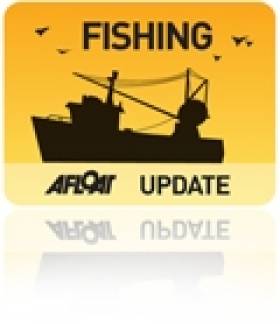Displaying items by tag: Young Fishmongers
Young Fishmongers Sharpen Their Skills For Second Annual BIM Contest
#Seafood - The five finalists in the Bord Iascaigh Mhara (BIM) Young Fishmonger 2015 competition had their practical skills put to the test today (12 November) ahead of the awards ceremony later this month.
BIM's Seafood Development Centre in Clonakilty, West Cork hosted the five men who made the shortlist as they were charged with filleting and preparing a range of fish and shellfish under strict time constraints.
The five finalists – Gerard Collier of Fisherman’s Catch in Clogherhead, Co Louth; Stevie Connolly of Connolly’s Fish Company in Rathmines, South Dublin; Mateusz Kowalik of Dorans on the Pier in Howth, Norh Dublin; Gary Quinn of Stephens Fish Market in Mullingar, Co Westmeath; and Neil Turner of Cavistons Food Emporium in Glasthule, South Dublin – have already been extensively judged in the competition.
This involved in-depth visits to their respective shops to assess their knowledge of seafood, their understanding of quality issues, skills, techniques and customer service.
Now in its second year, the BIM Young Fishmonger competition aims to recognise and reward young fishmongers and, in doing so, raise the bar across the sector in terms of product knowledge and skills.
"We are very proud of this initiative, it is a programme that directly recognises the high level of expertise and knowledge amongst young fishmongers around the country," said Donal Buckley, BIM’s business development and innovation director.
"It also promotes the valuable service a fishmonger provides to customers in terms of preparing and buying seafood and I hope this competition helps to encourage consumers to seek out their local fishmonger and support local business. Best of luck to all our finalists."
As part of their prize, the five finalists will receive a master class in seafood cookery from renowned TV chef and owner of Fishy Fishy restaurant in Kinsale, Martin Shanahan.
Finalists will also receive a specially designed trophy, a place on BIM’s retail development workshops, a set of professional knives and a cheque for €500. The overall winner will receive a study trip to France and a cheque for €1,000.
The winner of the Young Fishmonger 2015 competition will be announced at the Radisson St Helen’s Hotel in Stillorgan, South Dublin on 24 November.





























































